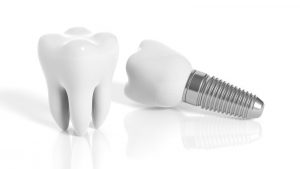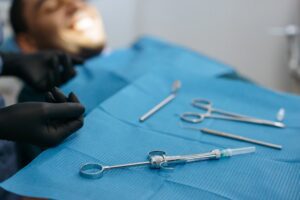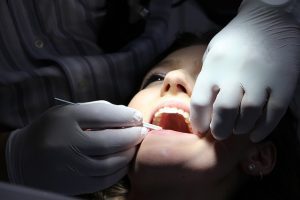Do you still have wisdom teeth? Not everyone is born with them, but most who are have them surgically removed as teens or young adults. Many dentists believe it’s better to remove wisdom teeth at a young age, before the roots and bone are fully formed, because they are more easily removed at this stage, and recovery from the surgery is quicker.
Because people in many, primarily Western, cultures have developed smaller lower jaws over the course of many generations, most people do not have room in their mouths for wisdom teeth to grow in properly. That’s why we often recommend young adults have them taken out before these back teeth cause problems. In the adult mouth, wisdom teeth, both exposed and unexposed, are the most common cause for infection, cavities, bone loss, damage to adjacent teeth, and cyst formation.
In spite of all this, many people over 25 still have their wisdom teeth, as oral surgeons tend to disagree on wisdom tooth extraction when someone’s wisdom teeth erupt fully with no complications. Or, maybe the patient chose not to have them removed because it didn’t seem like there would be problems in the future, they were afraid of the surgery, or financial concerns made the surgery impossible.
What Can Go Wrong with Wisdom Teeth
You can certainly live your whole life with your wisdom teeth intact. Sometimes they never erupt and never cause any problems. However, unerupted wisdom teeth pose an under-the-surface risk for complications like abscess, infection, and even soft tissue and bone death. Several issues may require you to have them removed as an older adult:
- Wisdom teeth may erupt partially and become impacted. When this happens, you can’t clean them properly, so they start to decay, causing gum disease. Cysts or tumors can develop. If a tooth is fully-impacted in bone and x-rays show that eruption is not likely, removal will be recommended.
- The teeth may grow in at an unnatural angle. Wisdom teeth that come in properly can have problems later, because cleaning them is tricky. If you have wisdom teeth, be vigilant about brushing and flossing them, and take your semi-annual wellness dental appointments seriously.
- You may not have enough room in your mouth for the wisdom teeth to come in properly. They may damage nearby teeth and affect your smile or bite. If they shift your other teeth around, they can encourage decay, loosen teeth, and cause tooth loss.
- Cavities or gum disease may make them a liability. Wisdom teeth naturally attract bacteria because they are hard to clean at the back of your mouth.
If a problem with your wisdom teeth does arise, you may or may not have pain. However, pain in the jaw is often the first sign of trouble. You may feel pressure at the back of your mouth, or the gum of the erupting wisdom tooth may become sensitive, swollen or inflamed. More urgent signs you need your wisdom teeth extracted include swelling of the face/jaw, bleeding gums, nausea, headaches, and fever.
Why We Watch Adult Wisdom Teeth Carefully
Because serious complications such as infection can occur, Dr. Puckett keeps a close eye on his adult patients with intact wisdom teeth. He recommends leaving them intact, however, as long as they don’t become infected or pose a risk to adjoining teeth.
If another dentist or oral surgeon recommends removing your wisdom teeth without a good reason, get a second opinion. Close monitoring by a dental specialist can ensure that if problems were to begin to arise, you’d catch them early. While it’s agreed that removing wisdom teeth is a useful preventative tool in young people, with adults, there’s reason to argue that if it’s not broken, don’t fix it. Dr. Puckett tends to air on the side of saving oral surgery strictly for times it’s necessary.
With Wisdom Teeth, it’s The Sooner, The Better
Teenagers and young adults have lower bone density than older adults. Plus, unlike adult wisdom teeth, the roots aren’t yet fully-formed, making the wisdom tooth extraction procedure a less traumatic process for the gums and jaw.
In addition, oral surgery is easier to perform, and young bones regenerate faster than older ones. So if you need wisdom teeth out later in life, the surgery can be more involved and the recovery time can be longer. That’s why with adult wisdom teeth, we often leave them if they’re not causing any issues.
Adult Wisdom Tooth Extractions Prevent Long-Term Problems
No matter what age you are, it’s still a good idea to get your wisdom teeth out if they’re causing problems in your mouth. The long-term issues you can face if the wisdom teeth are left intact can be much more serious than the hassle of surgery and recovery.
If you have any concerns about your wisdom teeth, make an appointment with Dr. Puckett, Oral Surgeon at Wilmington Oral Surgery, located in Wilmington, Ohio – and worth the drive from Cincinnati. He will assess your situation and make appropriate recommendations with a focus on skilled, efficient and comfortable care.










